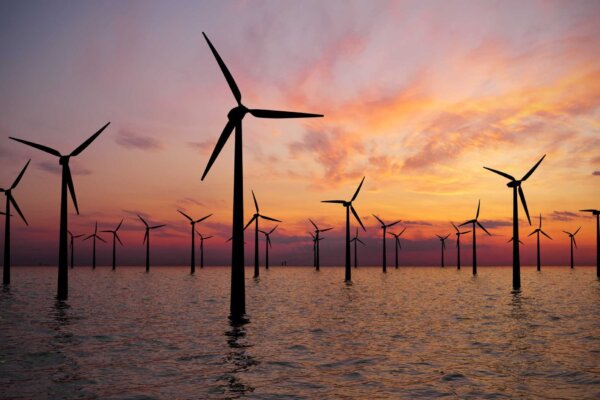April saw some major announcements for the energy world, from the UK government’s new Energy Security Strategy to the latest part of the IPCC’s major climate change report. There’s a lot to take in, but what does it all mean for businesses? Read on to find out.
The UK’s new Energy Security Strategy
Continued help for energy intensive industries to negotiate the energy crisis
IPCC report outlines emission reduction measures
New TCFD rules come into force
New public body launched to manage UK net zero energy transition
More action on the horizon…
The UK’s new Energy Security Strategy
The rising cost of energy continues to be a concern, affecting businesses of every size, as well as households. Because of this, there was added focus on the release of the government’s Energy Security Strategy1 aimed at increasing the UK’s energy independence.
So what is in the Energy Security Strategy and how does the government plan to make the UK more energy independent?
- On renewables, the aim is for 95% of the UK’s electricity to come from low-carbon sources by 2030. This includes increasing offshore wind capacity from today’s total of 10.4GW, to up to 50GW.
- In addition, solar power capacity is planned to increase five-fold from its current 14GW by 2035. In part, this would be achieved by relaxing planning rules for solar panels on commercial buildings.
- Targets for low carbon hydrogen production capacity are being doubled to up to 10GW by 2030, to help organisations in heavy industry and transport to reduce emissions.
Other announcements include the building of eight new nuclear reactors around the UK. New licences are also planned for oil and gas production in the North Sea which, the government says, would carry a lower carbon footprint than importing gas from abroad.
The government says the strategy will result in greater energy self-sufficiency with cheaper bills for businesses and homes in the long term2. However, some critics say it lacks plans for more immediate energy saving projects, such as insulating buildings3, and will increase carbon emissions from oil and gas production4.
Continued help for energy intensive industries to negotiate the energy crisis
High energy use businesses are set to receive extra Government support to help mitigate the cost of energy.
As part of the Energy Security Strategy, the Energy Intensive Industries Compensation Scheme is being extended by three years to 2025 and the level of support is increasing. Additionally, the current budget to support energy intensive industries is doubling to help businesses cover the costs of the UK Emissions Trading Scheme and Carbon Price Support mechanism in electricity bills. The scheme will now also provide support for companies that manufacture batteries for electric vehicles.
The government says the move will help ensure the UK remains “a desirable location for energy intensive industries”. If you already receive funding through the scheme, you will receive your payments as usual on a quarterly basis. For more information, click here.
IPCC report outlines emission reduction measures
In the third part of its Sixth Assessment Report, Climate Change 2022: Mitigation of Climate Change5, the UN’s Intergovernmental Panel on Climate Change (IPCC) says it’s “now or never”6 to limit global warming to 1.5°c. In its pathway to reduce emissions to levels that avoid the worst of the climate crisis, the report pushes for: investment in renewable energy, more wind and solar power generation, ending fossil fuel subsidies, low-carbon transport and buildings, energy storage, nature restoration and the decarbonisation of heavy industries.
It also looks at the role of technology in both limiting and reducing CO2 in the atmosphere, including low-carbon electrification, carbon capture and the use of hydrogen.
The report also highlights the important role businesses and industries play in achieving this. It says organisations should look to use materials more efficiently, reuse and recycle products and minimise waste. It warns: “Achieving net zero will be challenging and will require new production processes, low and zero emissions electricity, hydrogen, and, where necessary, carbon capture and storage.”
But the report also makes it clear that the cost of these solutions is much cheaper than the cost of doing nothing to tackle the climate crisis. So, to learn more about the steps you and your business can take towards a low carbon future, read the IPCC’s report, here.
New TCFD rules come into force
From April 2022, it has become mandatory for many UK companies to report on their Climate-related Financial Disclosures.
The Task Force on Climate-related Financial Disclosures (TCFD) was set up by the Financial Stability Board in 2015 and aims to make climate-related disclosures by businesses more consistent and therefore meaningful.
TCFD reporting falls into four key areas – governance, strategy, risk management and assessment targets, and is mandatory for UK companies who currently have to produce an annual non-financial statement. This includes listed companies, banks, or insurers with more than 500 employees7.
For more information on TCFD or to check if your business is required to report, visit here.
New public body launched to manage UK net zero energy transition
A new public body is to be set up to oversee Britain’s energy system, including the country’s net zero energy transition and longer-term planning of the nation’s gas system.
The Future System Operator (FSO) will be founded on the existing capabilities of the Electricity System Operator (ESO), and, where appropriate, National Grid Gas (NGG).
The new body will work with energy suppliers and networks to ensure energy resilience and security at a national level. It will take a whole-system approach to coordinating and planning the network, covering electricity, gas and offshore wind networks, as well as emerging markets such as carbon capture, energy usage and storage.
Businesses working towards net zero can find out more here.
More action on the horizon…
- MPs on the Environmental Audit Committee are urging the Government to introduce a carbon tariff on imports to ensure that low-carbon British manufacturers are not undercut by low-cost, high-carbon imports. Click here to read more.
- The Association for Renewable Energy and Clean Technology (REA) says nine in ten businesses have indicated improved regulations and policies would help them significantly boost the number of renewable energy and ‘clean technology projects’ they could deploy in the next two years. Read more here.
TALK TO OUR TEAM
We’re here to support your organisation and help you make sense of the current volatility in the energy market, as well as what new rules and regulations might mean for you and your transition to net zero. So, if you have any questions, speak to our team of experts on 0330 053 8620 or at heretohelp@brytenergy.co.uk.


